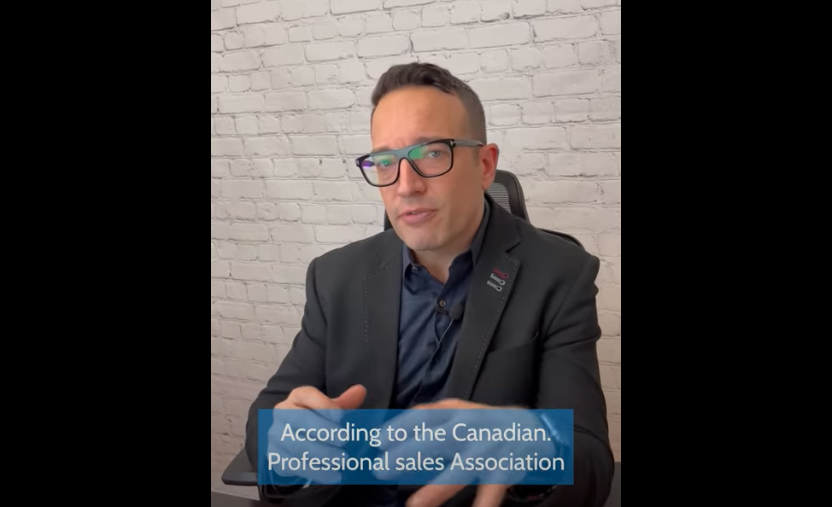Sales training must go beyond the classroom and include sales enablement, playbooks, and hybrid training programs.
According to the Canadian Professional Sales Association, the sales industry in Canada employs over 1.3 million salespeople and nearly 80% of those surveyed by the CPSA have not received any formal sales training from their employers. This lack of investment in employee development is a concern for sales leaders who are frustrated with ineffective performance from their team members.
As a sales professional, it’s essential to stay competitive in today’s market by continually improving your skills and knowledge. This requires ongoing training and development, which unfortunately is often neglected by many Canadian sales organizations. The truth is that sales leaders need to invest in their most valuable asset: their people. By doing so, they can achieve greater success for both their employees and their organization.
Shane Gibson sales trainer talks about investing in your salespeople:
In the battle for sales talent, organizations that invest in their salespeople have an advantage in recruitment, retention and sales performance.
If you’re considering investing in sales training for your team you need a sales training selection criteria. Sales training should be knowledge, competency, outcome, and implementation based. It should also be supported by a strong internal or external sales enablement program and team.
Here are 12 things to consider when selecting a sales training company or provider:
- Understand the Needs of Your Sales Team: Before investing in sales training, you must first understand the specific needs of your sales team. This will help you identify the areas that need improvement and determine which training programs will be most effective.
- Choose the Right Training Program: There are many sales training programs available, each with its strengths and weaknesses. Ensure that you select a program that aligns with the needs of your team and offers a comprehensive approach to training and sales enablement.
- Identify Your Goals: Be clear about your training objectives and what you hope to achieve through the program. This will help you measure the effectiveness of the training and ensure that it aligns with your organization’s goals. Too many sales programs are selected by topic instead of desired business outcomes.
- Consider the Learning Style of Your Salespeople: Everyone has a unique learning style. When selecting a training program, consider the various learning styles and modes of your sales team to ensure that the training is delivered in a way that resonates with them. Online sales training integrated with deeper offline training and coaching tends perform better and sustain performance improvements. Hybrid sales training will become the standard in 2023 and beyond.
- Determine the Time Commitment: Sales training can be time-consuming, so it’s crucial to consider the time commitment required from your team. Ensure that the training program fits within your team’s schedule and doesn’t disrupt their sales activities.
- Evaluate the ROI not the cost: Sales training is an investment, so it’s essential to evaluate the cost of the program against the potential benefits. Consider the return on investment (ROI) of the training and invest accordingly.
- Choose a Reputable Training Provider: Not all sales training providers are created equal. Do your research and choose a reputable provider with a proven track record of success. Accreditations from organizations like the Canadian Professional Sales Association can help you in the selection process. You also want to look at their approach to sales – does it fit your organizational culture and the client persona you sell to?
- Involve Your Sales Team in the Decision-Making Process: Involve your sales team in the decision-making process to ensure that they feel invested in the training program’s success. This will help create buy-in and improve engagement during the training. Your top performers can also be a great source of best practices that can be embedded in the program content.
- Measure the Effectiveness of the Training: Measure the effectiveness of the training program by tracking key performance indicators (KPIs) such as sales growth, customer satisfaction, and employee retention. This will help you determine the program’s success and make any necessary adjustments. Share these KPIs with your sales training provider so they can build a program that caters to them.
- Commit to Ongoing Training and Development: Sales training is not a one-time event. To achieve long-term success, you must commit to ongoing training and development for your team. This will help ensure that your sales team stays competitive and achieves greater success over time.
- Make sure it involves current sales technology and digital trends: Today’s sales organizations need to think about how they future-proof their sales process. They need to leverage the sales technology of today such as social media, AI, and automation while keeping an eye other vital trends on the horizon. Your sales training partner must be well versed in these technologies and have the ability to teach and help implement them.
- Build a Sales Playbook: Go beyond training and invest in developing a Sales Playbook based upon your process and methodologies. This will give your team and easy to access single source reference on your best practices, processes, and sales methodologies.
Investing in sales training is an essential investment in the growth and success of your sales team and organization. By considering these twelve essential factors, you can select a training program that aligns with your team’s needs and goals and achieves lasting success. Remember, your sales team is your most valuable asset, so invest in their growth and development to achieve greater success for all.
If you’re looking for B2B Sales Training for your team check out our latest online program The B2B (Business to Business) Sales Specialist Certification Program delivered in partnership with Jelly Academy and accredited by The Canadian Professional Sales Association.
About the author:
Shane Gibson is a Vancouver based sales author, sales trainer and keynote speaker. He is also CEO of The Professional Sales Academy an international sales training company with clients in Canada, USA, South America, Southern Africa, Asia, and the Middle East.


